I was browsing Instagram recently and saw this post from Isabel Foxen Duke‘s ‘gram:
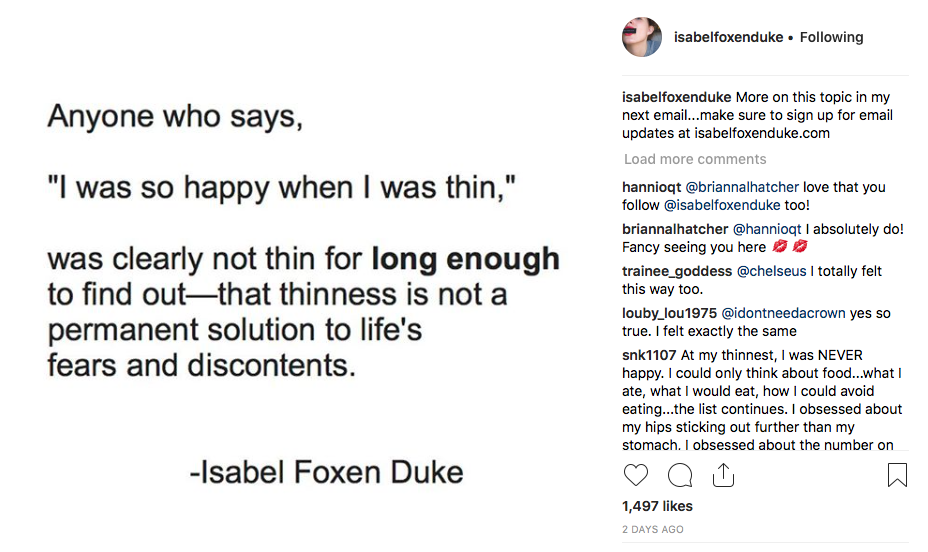
I sat with this for a minute. I thought about it. I closed Instagram. I wanted to comment, but I also wanted to think about why this post was so immediately troubling to me. I needed to gather my thoughts.
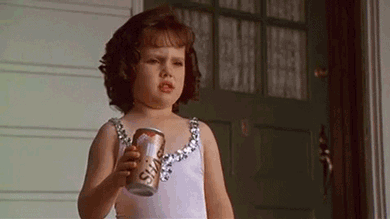
And here it is: this post minimizes the pain and oppression of fat people.
Oppression Leads to Depression
This seems like a fairly simple concept, but perhaps it needs to be explained more. Fat people are systemically oppressed. Oppression sucks. Oppression is painful. And systemic oppression results in higher rates of depression, across the board.
The area where this connection has been studied the most is in class oppression, or poverty. “About 31% of Americans in poverty say they have at some point been diagnosed with depression compared with 15.8% of those not in poverty,” says this Gallup report by Alyssa Brown. And, not too far from this line, we see the “o” word: “Impoverished Americans are also more likely to report asthma, diabetes, high blood pressure, and heart attacks — which are likely related to the higher level of obesity found for this group — 31.8% vs. 26% for adults not in poverty.”
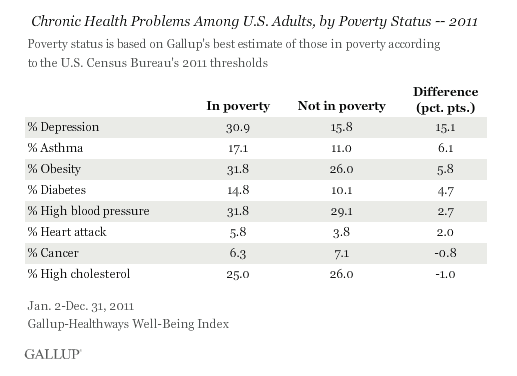
This article from NPR also echoes the fact that people living in poverty experience depression at higher rates. “People who live in poverty appear to be at higher risk for mental illnesses. They also report lower levels of happiness,” writes Emily Sohn. While the link is more correlation than causation, the evidence is clear: people living in poverty are more likely to experience depression. More than the dreaded “obesity,” more than the much-touted epidemic of diabetes, poor people are more likely to be depressed. Experiencing poverty in childhood may even cause altered brain connectivity. Being oppressed is fucking stressful.
And while the links between poverty and depression are much more well-studied, it’s reasonable to assume that societal, systemic oppression in general has an effect on the rates of depression and general happiness of the people experiencing it. Women and African-Americans are generally more likely to report being depressed. Why? In the interest of being scientific and whatnot, I won’t draw conclusions … but one can probably guess, right? According to the Huffington Post piece, African-American women are significantly more likely to report depression than white women. (They’re also far less likely to receive treatment.) Cry “correlation is not causation!” at me all you want, but here’s the fact: these women live in the intersection of several different forms of systemic oppression. No wonder they are depressed.
Poor Treatment of Fat People Affects Our Mental Health & Well-Being
As much as I like to beat the drum that you can be happy and thrive at any size, it’s important to remember: we live in a world that hates fat people, was not built to accommodate us, considers our bodies an “epidemic,” does not offer us representation, and is not concerned with out comfort or happiness. To be fat is to be at war with a world that so desperately wants you to not exist.
Fat bias starts early, from ages 9-11. And the human toll of this bias is real, even deadly. “Experiencing weight stigma has been linked to many negative emotional consequences, including depression, anxiety, body dissatisfaction, and, in some individuals, increased risk for suicidal ideation.” Fat children are taught to hate themselves at the same time other children are taught to hate fat people. This puts us at higher risk for depression, anxiety, and (duh) makes us fucking unhappy.
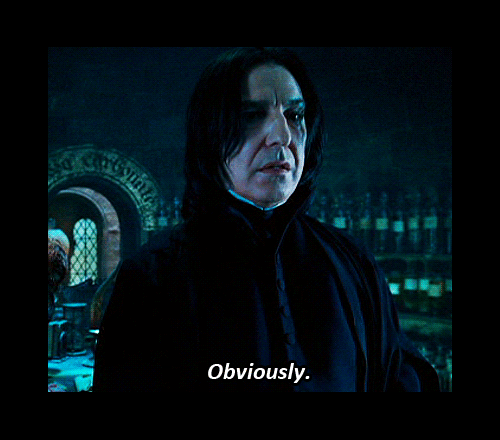
Again, oppression sucks.
And this continues into adulthood. Fat adults are less likely to be hired for jobs or get promoted, and women are worse off than men in that regard. We are considered “lazy, weak-willed, unsuccessful, unintelligent, lack self-discipline, have poor willpower,” and more, according to this study that examines the effects of weight stigma. This bias ripples through multiple areas of our lives, from the workplace to the doctor’s office to education and beyond. To say that weight bias makes happiness an uphill climb is an understatement.
Weight and happiness are correlated. No, thinness is not a permanent solution to life’s fears and discontents. But thinness sure as hell makes nearly every aspect of life a lot easier.
And, to move away from statistics and studies for a moment, was I happier when I was thinner? Not really. I still struggled with depression and anxiety, two dark clouds that have hung over my head since childhood. Being thinner was not a cure for any of it. (Of course, I was still fat. Just a smaller fat.) But I’ve gained a lot of weight in the past five years. And I can tell you this: being thinner made life a lot easier in a lot of ways.
Thin Privilege in Health At Every Size (HAES) and Intuitive Eating (IE)
Linda Bacon has addressed this in her books, her social media, and summed it up nicely in this short Facebook post:

And the truth is that many of the people leading the charge for Health At Every Size and Intuitive Eating are able to lead because of their thin privilege.

This is it in a nutshell. People are able to get book deals, book speaking engagements, have a platform to advocate for fat bodies and Health At Every Size and Intuitive Eating because they are not fat. Often, when fat people try to advocate for themselves and their own bodies, it is simply dismissed as a desperate attempt to rationalize the moral failure of their fatness. Fat people who talk and write about Health At Every Size and Intuitive Eating and body kindness are assumed to have simply “given up.” Check your Instagram feed. What do the body positive accounts you follow look like? What do the Intuitive Eating experts whose books you buy look like?
Being visible, outspoken about weight bias and discrimination, and fat usually results in abuse. Ask Lindy West. Ask Tess Holliday. Ask ljeoma Oluo. Ask Roxane Gay. The world does not take fat people seriously, particularly not about their own experiences and bodies.
Increasingly, I’ve become frustrated with the lack of representation in HAES and Intuitive Eating communities. I am constantly marketed to: sign up for my emails, the smiling thin white woman posing whimsically with a cake insists. Sign up for my (expensive) online course on Intuitive Eating and body positivity. Buy my book, which is in pastel colors and has an attractive picture of the author’s thin, pretty, white face on the back, if not the cover.
But I do not, because these women do not look like me. They have not walked a mile in my size-26 jeans (which don’t even fit properly because jeans both in my size and properly fitting are a mathematical impossibility, apparently). What do they know about my experience? What can they teach me, when their experience is so removed from mine? How can they understand me, my body and my struggles?
Pushing a Health At Every Size & Intuitive Eating Agenda… The Right Way
I’m not saying these women have nothing of value to say. They do! I have read plenty of their blogs and their books and I support what they do. But in order to fully combat the diet industry’s hold on women, and to truly be an ally in the war against fat, one must first acknowledge the pain of being fat.
Dieting isn’t the answer to escaping the pain of fat oppression. Most importantly, it doesn’t fucking work, and can even make the struggle to be healthy and happy even harder. But, please, before you post things like this, listen to fat people.
For many fat people, the urge to lose weight is not about vanity or fitting into smaller pants or looking a certain way. It is about survival.
So many fat people long for thinness because they long for freedom.
You must understand this if you are to be an ally. If you want to sell me paid online courses and books and have me sign up for your emails, you must first understand this. You must check your thin privilege and be humble and listen and learn.
If I were thin, I would not fear going to the doctor to the extent that I do. I fear going to the doctor because I have gone to see a doctor about an upper respiratory infection and left with a recommendation to attend a weight loss surgery seminar. I fear not being listened to, being dismissed, labeled as “non-compliant,” blamed for my illness and symptoms. I need thin people and people working from a HAES framework to advocate for me, because I am not listened to, I do not have the same credibility they do. I need them to advocate for me, because my fat body damages my credibility, while their thin bodies bolster theirs.
If I were thin, I would not worry about being kept in invisible positions at my job because of my size. And this has happened to me — I once worked for an organization that would not pay for me to attend a conference that I had helped plan because they did not want someone of my size representing them at a booth. I would not have to worry about not receiving a job offer because of my size. I would not need to obsess over my appearance before job interview, knowing that because of my size, the people interviewing would likely already assume I was sloppy, disorganized, less capable, and less intelligent.
If I were thin, I would not hesitate to reach out for help with my depression and anxiety because I fear being prescribed exercise and sunshine and Weight Watchers as remedies instead of medication. This has also happened to me.
If I were thin, I could go to a restaurant with my husband without the flash of fear when the host is taking us to our table. Will they put me in a booth? Will the booth have a table that moves? Will I be able to easily navigate between tables? Will the chair support me? Will the chair have arms? Or will I have to request a table from a confused host? Or be forced to spend the meal squished into a seat that doesn’t fit me? I have left restaurants with bruises on my stomach from being seated in booths that are too small for me.
I mean, fuck thin privilege, let’s talk about chair privilege. Have you ever bought expensive tickets for a show at a nice theater, only to spend two or more hours squeezed into a seat too small for your body? Have you left a Paul McCartney concert with bruises on your hips because the chairs were too goddamn small? (Those tickets were $400, by the way.) Have you been forced to sit in an all-day conference and spent your lunch break nursing bruises on your legs from where they pressed into the metal arms of the chair? I have. Or, have you wanted to go see Harry Potter and the Cursed Child on Broadway desperately, but been scared to spend the money on a ticket because you have no idea what the chair situation is like and you’ll be spending a minimum of four hours with your butt in a seat that might actually physically hurt you? (If you can fill me in on the chair situation at the Lyric Theater, help a nerd out and leave a comment.)
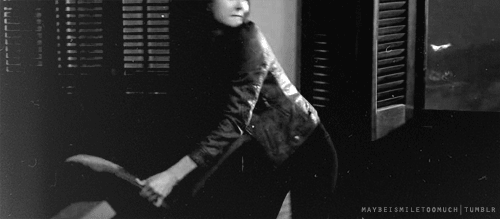
The amount of mental energy I devote just to chairs on a weekly basis is astounding. Have you ever had to think about chairs? If you haven’t, please don’t try to tell me that being thin doesn’t make life easier. If I had back the amount of headspace simply devoted to chairs, I’d be able to rule to damn world. And, yes, something as simple as removing the chair calculations I must do in my head on a daily basis would make me so much happier.
If you want to be an ally, and sell me books, and get me on your email list so you can market to me, first try to understand. My reasons for struggling against diet culture, my reasons for being a chronic dieter who embraced HAES and IE, are totally different than yours. For me, life would be easier if I lost weight. I would be happier. I have chosen a more difficult path because I believe that body liberation and fat activism are more important. Choosing to tell diet culture to go fuck itself and live your best life without dieting is totally different when you’re making a conscious decision to live oppressed and fight against that oppression. It’s not just a decision to kick Weight Watchers to the curb for good and eat dessert without guilt, it’s a decision to live your life opposing the systems that oppress fat bodies.
It’s not about cake. It’s about fighting for liberation.
Being Fat and Happy is Totally Possible! But Harder
So, I am currently pretty happy. And I’m fat. But let me tell you: this was a hard road. I did not get here easily.
I am finally in a job where I make a decent living, can pay my bills, have health insurance, and am relatively financially secure. But it took a decade of being hideously underemployed to get here. It took a ridiculous amount of gumption. It took night classes, taking online courses to learn new skills that would make me a more attractive candidate, paying my dues in jobs where I was not paid appropriately or promoted but learned every single thing I could, and sheer fighting to get here. And truth be told, I should probably still be making more than I am. I should probably have a better title, and more authority. So, to some degree, I’m still underemployed. But at least I’m at a level of underemployment that is comfortable for me.
I’m happily married, and my husband is awesome. We have a house and two cute rescue pets together and things are pretty great. (Also, shoutout to my white, cis, straight privilege!) And I still sometimes struggle with fear of when my fit, not-fat husband introduces me to his work colleagues and friends who haven’t met me. What will they think? What will they say? Will the talk about me behind my back, wonder why he’s with me?
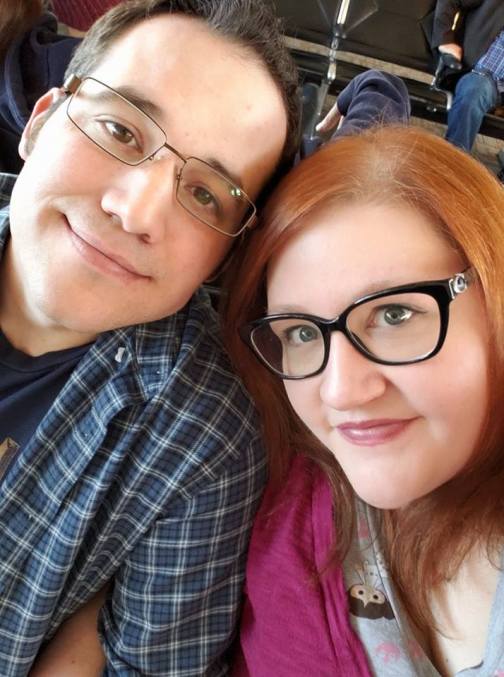
I also still struggle. I have days where I would give anything to be thinner. It’s not like there’s a promised land of total peace with your body. Until the world is kinder, more accommodating, more accepting of people with bodies like mine, I will continue to struggle.
And it’s not because of my weight, don’t misunderstand me. It’s because living in a world where you are oppressed is fucking hard.
So, people who make a living spreading the gospel of Intuitive Eating and Health At Every Size, I salute you. I also ask that you not minimize the pain and suffering of fat people, minimize or deny our oppression, and please periodically ask check your privilege and ask yourself, “What am I doing to end the oppression of fat people?”

This post is amazing and so well written! I don’t live in a body that meets the thinness standards of our culture, but I also am aware that I still benefit from some aspects of thin privilege, like not having to worry about chairs or being able to find clothes in some mainstream stores. It’s kind of mind boggling to me how many people vehemently deny that thin privilege exists. ( Although most people’s reaction to having any of their privilege pointed out to them is often quite intense). I’m sharing your post on fb because my hope is that people who understand the concept of allies for other oppressed groups will read it and realize that fat people need allies too.
I may not be able to relate to all of of your experiences, but I wanted to say that I see it, and it’s not right that anyone is oppressed in this way, and I’m listening.
LikeLiked by 1 person
Thank you so much! I have plenty of privilege of my own (I’m white, straight, cis, and can still find clothing in plus-size stores — even if it doesn’t always fit perfectly). I just hope that as HAES becomes more mainstream we keep its social justice roots at the forefront; like the body positive movement, it’s prime for hijacking and erasing the people who need it the most.
LikeLike
Thank you for this post. I’m studying nutrition and will be a HAES and Intuitive Eating licensed nutritionist before long. I am not thin, but I am still in a straight-sized body and I know this will somewhat hinder my credibility amongst the mostly thin nutritionists and RDs out there, though maybe not as much as if I were larger than I am. It’s hard to actually have nutrition professionals in larger bodies because so much of just choosing to go into this sort of career is filled with the bias that in order to succeed, you MUST be thin. I hope this will change and more people who actually want to study nutrition related healthcare careers and are in larger bodies will do so, despite the difficulty of this, so that there will be more size representation and not just understanding for people in larger bodies.
LikeLiked by 1 person
Thank you for reading! And, yes, I know it’s soooo hard to even study nutrition if you don’t fit the “image,” I’ve read some great blogs from students about the pressure to fit in (and the effects it can have on some of them). I hope that the most people who get into it without having the “perfect” nutritionist body will help pave the way for more size diversity, thank you for fighting the good fight!
LikeLike
Yes. This. Chair privilege.
LikeLike
I freaking LOVED this post. Really puts into words my own experience. I’ve been accused so many times of falsely believing being thin would make be happy and this really says exactly what I’ve wanted to be able to say.
Also in regards to cursed child. The seats are pretty cramped. Not as bad as some broadway theatres, but still small. I JUST fit – but I’m a relatively small fat person. I think there were some chairs without sides or armrests on the edges of the dress circle and boxes but I’m not positive.
LikeLike
Omg – the chairs!!! Thank you for that! In my line of work – the chairs, the airline seats, the cars, the hotel shower, all of it. So much mental math!! I would be a flippin’ savant if I didn’t take up so much brain space with chair math!!
LikeLike
Extraordinary understanding and communication ability. Immeasurable thanks.
LikeLike
Well said!!!! I totally agree!
LikeLike
So so good!! I’d leave the house more often if I didn’t have to worry about chairs. 🤬 And I DEFINITELY worry about people wondering why my gorgeous husband is with me. 😢 These 2 things are the majority of my anxiety and depression.
LikeLike
Inspiring post. Thank you for sharing. I really like the concept of your blog. Wish you all the best – speak766
LikeLike
HAES targets many different segments of our society, and does a lot of work with the eating disordered population. I can definitely see how that Instagram post would be hurtful to many. But I think when directed towards those recovering from eating disorders, especially anorexia, this is a really powerful statement. Sitting in a “perfect body” wasn’t worth feeling like death every day. I wish she would have made a point to mention her audience.
LikeLike
Thanks for your thoughts. I got the feeling that was her intended audience, but here’s the thing: Thin women aren’t the only people suffering from eating disorders. Many fat people suffer from anorexia, bulimia, orthorexia, binge eating disorder… and they are under diagnosed and less likely to receive treatment because of the assumption that people who suffer from eating disorders must be thin. So, if someone is reaching out to people with eating disorders with a comment specifically, that’s all well and good, but that audience includes fat people. And the fact that so many people think it doesn’t include fat people is part of the problem.
LikeLike
Completely and 100% agreed. That makes a lot of sense.
LikeLike
I think it may have been Lindy West who said that fat positively is a pre requisite to body positivity- not an extracurricular. This is a movement built by and for unapologetically fat people, Lao old women of color, and it’s being co-opted by thin white cis woman. Some of the social media content borders on “fitspiration”, and it gets very very tiring. Of course, we do have our thin allies like Linda Bacon, Christy Harrison, and countless others. There’s room for everyone in HAES and body positivity, but it’s ridiculous that the original message became so diluted.
LikeLike
Started reading your blog as one of your posts was ‘specialed’ by WordPress. This and the other post are well written. It is interesting to read of your experiences as you make your way through life. Sounds like you do it with dignity and grace. I have to say I don’t share much in common, I’m black, female and live in the UK, I’m 140 lbs and do not think of weight in quite the same way. I have my own specific set of battles to fight. I just remember the important of being kind and considerate to everybody. It cost nothing to be nice. Have a great day and I will continue reading your posts with interest.
LikeLiked by 1 person
Sure, you may be fat but you have no clue how privileged you are with a decent job, money to do things like travel, and a spouse who loves you. I’m older, unemployed and with few job prospects because I am older. You have money to live a decent life. As a poor, older person, I don’t care if I have thin privilege. Why should I care about comfortable chairs in restaurants or being able to fit in a single airplane seat when I can’t afford to eat out or travel? Instead of being worked up about thin privilege, why don’t you count all the things you are thankful for?
LikeLike
I acknowledge that I am privileged in many respects. I am white, cisgender, heterosexual, and comfortably middle class. I am grateful for the advantages I have in life and the things it has afforded. But just like someone saying, “Hey, count your blessings, at least you aren’t fat!” doesn’t make ageism, employment discrimination because of your age, money problems, and loneliness disappear, counting my blessings doesn’t help me access better healthcare or access more public spaces. I care about issues related to ageism, race, homophobia, transphobia, and income inequality too. I care about size discrimination because it personally impacts me. Just like you’re most focused on issues that personally effect you. But people can care about multiple things. I can care about the fact that you have difficulty finding a job because of your age AND ask for better, more accommodating seats on planes and in restaurants. Me caring about both of those things takes absolutely nothing from you.
And this blog post specifically addresses unchecked thin privilege in circles dedicated to body liberation and weight. So, if this does not concern you, or you are not familiar with those circles, you are welcome to dismiss it.
LikeLike
Reblogged this on Things Carla Loves and commented:
‘Being visible, outspoken about weight bias and discrimination, and fat usually results in abuse. Ask Lindy West. Ask Tess Holliday. Ask ljeoma Oluo. Ask Roxane Gay. The world does not take fat people seriously, particularly not about their own experiences and bodies.
So, people who make a living spreading the gospel of Intuitive Eating and Health At Every Size, I salute you. I also ask that you not minimize the pain and suffering of fat people, minimize or deny our oppression, and please periodically ask check your privilege and ask yourself, “What am I doing to end the oppression of fat people?” ‘
LikeLike
Thank you for this post. I have been struggling with the majority of the intuitive, anti -dieting accounts because as you mention they are all from white thin ‘ straight sized women’ and I just do not see myself in any of them as
south asian short plus size women. I had desperately looking for someone to notice and acknowledge this….thank you so much for writing about this!
LikeLike